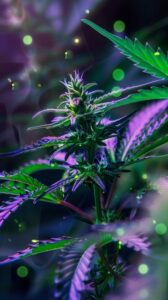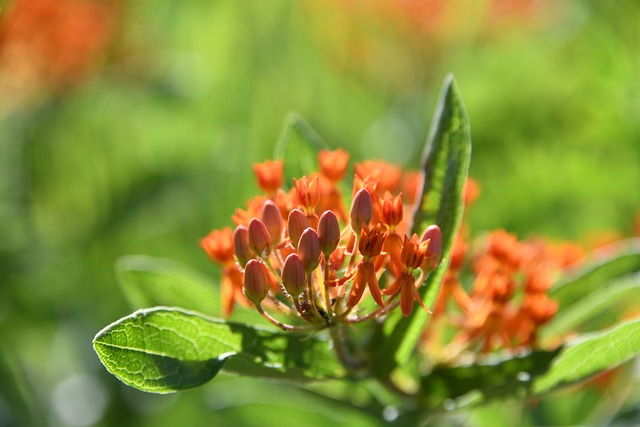
The THCA flower, a non-psychoactive form of cannabinoid found in raw cannabis plants, is under scientific scrutiny for its promising anti-inflammatory properties. Research shows that THCA interacts with the endocannabinoid system, particularly targeting CB2 receptors, to exert these effects. Its ability to potentially inhibit pro-inflammatory cytokines like TNF-alpha, IL-6, and IL-1beta, as well as enzymes such as COX-2 and 5-LOX, makes it a subject of interest for treating inflammatory conditions without psychoactive side effects. THCA is also noted for its impact on PPAR-gamma receptors, which contribute to the resolution phase of inflammation and support tissue repair. The anti-inflammatory potential of THCA flower is supported by historical use, cultural significance, and contemporary scientific studies, with ongoing research focusing on its therapeutic applications in managing chronic inflammation. Preclinical and early human trials demonstrate its efficacy, suggesting that THCA flower could be a safe and effective treatment for various inflammatory disorders. Proper cultivation practices are crucial to maintain the integrity of THCA, ensuring that consumers receive a product rich in cannabinol (CBN) and cannabidiolic acid (CBDA) with potent anti-inflammatory benefits.
Explore the natural prowess of THCA flower, a promising anti-inflammatory agent rooted in cannabis’s rich history. This article delves into the intricate chemical composition that underpins its potent properties and examines historical cultural significance in inflammation management. Discover how THCA flower’s unique mechanism of action sets it apart, supported by clinical evidence for its efficacy in treating inflammatory conditions. Learn best practices for cultivating and consuming THCA flower to harness its full anti-inflammatory potential.
- Unveiling THCA Flower: A Natural Anti-Inflammatory Phenomenon
- The Chemical Composition of THCA and Its Anti-Inflammatory Properties
- Historical and Cultural Significance of Cannabis in Inflammation Management
- THCA Flower's Mechanism of Action Against Inflammation
- Clinical Evidence: The Efficacy of THCA Flower for Inflammatory Conditions
- Cultivating and Consuming THCA Flower for Optimal Anti-Inflammatory Benefits
Unveiling THCA Flower: A Natural Anti-Inflammatory Phenomenon
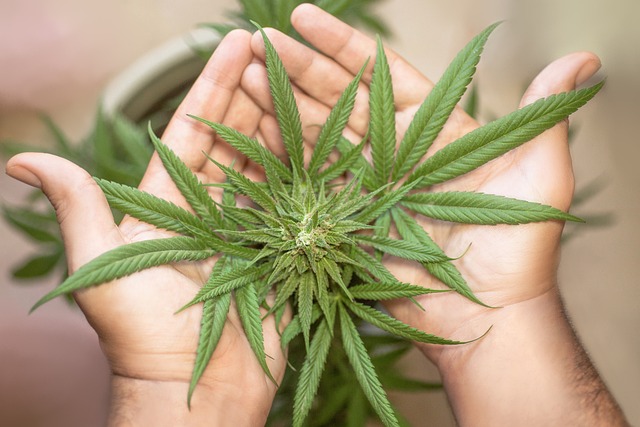
Unveiling the therapeutic properties of THCA flower, a non-psychoactive cannabinoid found in the early stages of cannabis cultivation, reveals its potential as a natural anti-inflammatory agent. Tetrahydrocannabinolic acid (THCA), which precedes THC (tetrahydrocannabinol) in the plant’s maturation process, exhibits a unique profile that may offer significant health benefits. Laboratory studies have indicated that THCA interacts with the body’s endocannabinoid system, particularly the CB2 receptors associated with regulating inflammation and immune responses. This interaction is thought to contribute to its anti-inflammatory effects, making it a subject of interest for those exploring natural approaches to managing inflammatory conditions without the psychoactive side effects typically associated with THC.
Furthermore, the anti-inflammatory effects of THCA flower are not solely based on its interaction with the endocannabinoid system. Preliminary research suggests that THCA may also inhibit certain enzymes and receptors involved in inflammation pathways. Its potential to modulate the immune response and alleviate symptoms associated with inflammation, such as pain and swelling, is an exciting area of exploration within the field of natural medicine. As scientific interest and research continue to grow, the role of THCA flower in combating inflammatory disorders holds promise for future therapeutic applications.
The Chemical Composition of THCA and Its Anti-Inflammatory Properties

∆9-tetrahydrocannabinolic acid (THCA) is the non-psychoactive precursor to the well-known psychoactive compound ∆9-tetrahydrocannabinol (THC). Found abundantly in raw cannabis flowers, THCA has garnered attention for its potential health benefits, among which are its anti-inflammatory effects. The chemical structure of THCA includes a phenolic hydroxyl group, which is pivotal in exerting anti-inflammatory activity. This structure allows THCA to interact with the body’s endocannabinoid system, particularly the CB1 and CB2 receptors, modulating inflammation and pain responses without the psychoactive side effects associated with THC. Studies have demonstrated that THCA can inhibit certain pro-inflammatory cytokines and enzymes, such as COX-2 and 5-LOX, which are known to play a role in various inflammatory diseases. This action of THCA suggests its potential therapeutic use in conditions characterized by inflammation, such as arthritis, colitis, and other autoimmune disorders. The anti-inflammatory effects of THCA flower are attributed to its unique cannabinoid profile, making it a subject of growing interest in natural and alternative medicine.
Historical and Cultural Significance of Cannabis in Inflammation Management

THCA flower, or tetrahydrocannabinolic acid, is a non-psychoactive cannabinoid found in the Cannabis sativa plant that has garnered attention for its potential anti-inflammatory effects. Historically, cannabis has been utilized across various cultures for its medicinal properties. Ancient texts from China document the use of cannabis for its healing qualities, including the management of inflammation. This historical use sets a foundation for the current scientific investigation into the anti-inflammatory mechanisms of THCA.
The cultural significance of cannabis is vast and varied, with its use in traditional medicine spanning continents. From Asian herbalism to indigenous American remedies, cannabis has been recognized as an anti-inflammatory agent. Modern scientific research supports these historical accounts, suggesting that THCA flower interacts with the body’s endocannabinoid system, influencing the resolution of inflammation. This interaction may offer therapeutic potential for a range of inflammatory conditions, making the study of THCA flower’s anti-inflammatory effects a significant area of research within the field of natural medicine.
THCA Flower's Mechanism of Action Against Inflammation

Delta-9-tetrahydrocannabinolic acid (THCA) is the non-psychoactive precursor to the well-known cannabinoid delta-9-tetrahydrocannabinol (THC). Found in raw cannabis plants, including the THCA flower, this compound exhibits potent anti-inflammatory effects. The mechanism of action for THCA’s anti-inflammatory properties involves the modulation of several key signaling pathways within the body’s endocannabinoid system. Specifically, THCA interacts with the cannabinoid receptors type 1 (CB1) and type 2 (CB2), which are integral to the regulation of immune responses. By binding to these receptors, THCA can inhibit pro-inflammatory cytokines, such as TNF-alpha, IL-6, and IL-1beta, that play a central role in inflammation. This inhibition leads to a reduction in the activity of immune cells like macrophages and microglial cells, which are often implicated in chronic inflammatory conditions. As a result, THCA flower has the potential to be beneficial in managing various inflammatory disorders, suggesting its therapeutic value as an anti-inflammatory agent.
Furthermore, THCA’s anti-inflammatory effects are also mediated through the activation of peroxisome proliferator-activated receptors (PPARs), particularly PPAR-gamma. These receptors are involved in regulating gene expression related to immune function and inflammation. By activating PPAR-gamma, THCA promotes a resolution phase of inflammation, characterized by the production of anti-inflammatory molecules called specialized pro-resolving mediators (SPMs). This shift helps to dampen the prolonged inflammatory response and initiate tissue repair processes. Incorporating THCA flower into health regimens may thus offer a natural approach to managing inflammation associated with various conditions, warranting further research into its potential therapeutic applications.
Clinical Evidence: The Efficacy of THCA Flower for Inflammatory Conditions
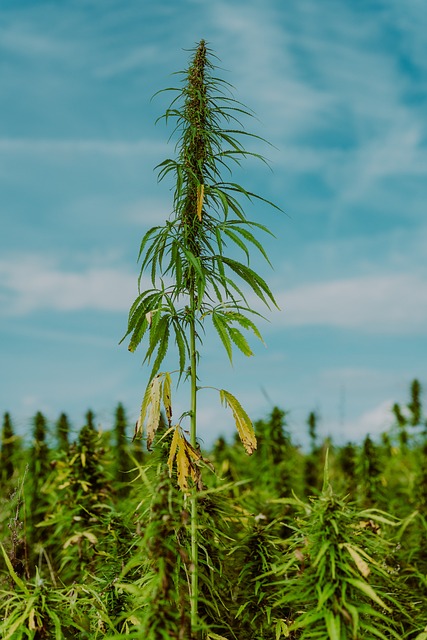
The therapeutic potential of THCA flower, or tetrahydrocannabinolic acid, as an anti-inflammatory agent has been a subject of growing interest within the clinical research community. Preclinical studies have demonstrated that THCA, the non-psychoactive precursor to THC, exhibits significant anti-inflammatory effects, which may be harnessed for treating various inflammatory conditions. Research conducted on animal models has shown that THCA can inhibit pro-inflammatory cytokines and enzymes involved in the inflammatory response. These findings suggest a promising avenue for the development of anti-inflammatory treatments, particularly for those who seek alternatives to traditional pharmaceuticals. Furthermore, human clinical trials have begun to explore the efficacy of THCA flower in managing symptoms associated with conditions characterized by chronic inflammation, such as arthritis and bowel diseases. The preliminary results are encouraging, indicating that THCA may offer a safe and effective means of reducing inflammation without the psychoactive effects typically associated with cannabis products containing THC. As research progresses, it is expected that a more comprehensive understanding of the optimal dosing and administration methods will be established to further validate its clinical benefits for inflammatory conditions.
Cultivating and Consuming THCA Flower for Optimal Anti-Inflammatory Benefits
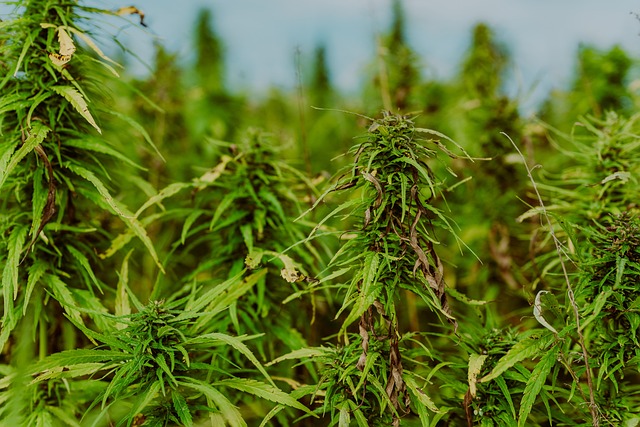
Cannabinol (CBN) and cannabidiolic acid (CBDA), which are both present in THCA flower, have been studied for their potential anti-inflammatory effects. Unlike tetrahydrocannabinol (THC), the psychoactive component of cannabis, THCA remains non-psychoactive and offers a wide range of therapeutic properties. When cultivating THCA flower with the aim of maximizing its anti-inflammatory benefits, it’s crucial to focus on optimal growing conditions that include proper lighting, temperature control, and soil quality. Harvesting at the right time, when the trichomes are cloudy and the plant has peak cannabinoid levels, is also essential for ensuring a potent THCA flower.
For those interested in consuming THCA flower for its anti-inflammatory effects, it’s important to consider different consumption methods that can influence bioavailability. Vaporizing or smoking THCA flower provides almost immediate effects, as the cannabinoids are absorbed directly into the bloodstream through the lungs. Alternatively, decarboxylating the THCA to convert it into THC can enhance its anti-inflammatory properties when ingested, although this process will diminish its psychoactive impact. Regardless of consumption method, the key to harnessing THCA flower’s anti-inflammatory effects lies in the cultivation and processing of the plant to preserve its natural compounds and ensure a safe and beneficial experience.
The exploration of THCA flower as a natural anti-inflammatory agent reveals a promising alternative in the realm of inflammation management. The intricate chemical composition of THCA and its potential therapeutic properties, rooted in historical and cultural significance, present a compelling case for its consideration. The mechanisms by which THCA flower combats inflammation are detailed and suggest a scientifically sound basis for its anti-inflammatory effects. Clinical studies lend credence to the efficacy of THCA flower in addressing various inflammatory conditions. For those interested in harnessing these benefits, insight into cultivation practices and responsible consumption ensures optimal use of this natural substance. In light of the evidence presented, the THCA flower stands out as a noteworthy contender in the arsenal against inflammation.
